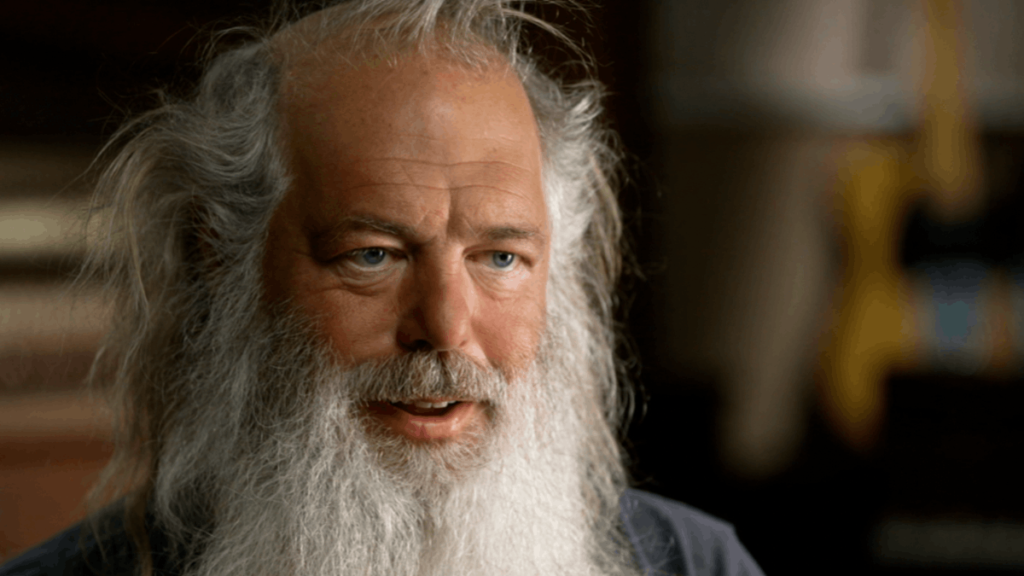Rick Rubin’s journey into music production is a story of raw instinct and a relentless drive to capture authenticity. With almost no formal technical knowledge, Rubin has made an indelible mark on hip-hop and popular music by following his intuition rather than established studio techniques. His entry into production, marked by the single “It’s Yours” by T La Rock and DJ Jazzy Jay, came at a time when rap was still in its infancy, confined mainly to single records that didn’t capture the raw energy of live performances.
Rubin’s approach was—and remains—unusual in the music industry. Most producers rely on years of training, learning the technical aspects of sound engineering and production. Rubin, however, was driven by a singular mission: to create records that felt as powerful and unfiltered as the music he heard at New York City clubs like Negril, where hip-hop was emerging as a cultural force. At these venues, Rubin, who was also a DJ, experienced firsthand the drum machines and DJ culture that defined early hip-hop. This scene was electric, pulsing with experimental energy, but the records available at the time felt polished, restrained, and more in line with R&B than the raw sound that was evolving in the clubs.
It was this disconnect that drove Rubin to produce his first track. In a recent interview with Rick Beato, Rubin recalled how he was moved to meet Kool Moe Dee of the Treacherous Three, his favorite rap group, simply because he wanted to discuss the lack of genuine representation of hip-hop’s sound on record. Rubin’s enthusiasm and genuine love for the genre paved the way for him to work with T La Rock and DJ Jazzy Jay, two pioneers in hip-hop, for the single “It’s Yours.” Released in 1984 on his own label, Def Jam Recordings, Rubin’s first production was bold and unconventional. The single captured the raw energy he had sought, blending stark beats with minimal polish, a stark contrast to the R&B-influenced records produced by industry professionals unfamiliar with hip-hop’s underground culture.
In essence, Rubin’s first record was about more than just production—it was about preserving a culture and translating it into a sound that felt true to its roots. During this era, the music industry was only beginning to take notice of hip-hop, and many producers attempted to shoehorn the genre into traditional molds, sanitizing its rough edges and raw feel. Rubin, however, saw the value in the unfiltered essence of hip-hop, particularly in its live performances. “It’s Yours” was groundbreaking in this sense, with its stark beats and aggressive vocal delivery that more accurately represented the atmosphere of the clubs where hip-hop was born.
What’s fascinating about Rubin’s early work is that it was instinctual, devoid of the conventional, formulaic approach that governed the music industry. While other producers worked meticulously with studio equipment and focused on the theoretical aspects of sound production, Rubin bypassed this, focusing solely on what felt right. In his own words, he never cared about the technical side as long as the result sounded good. This approach set him apart from other producers and positioned him as a maverick in the industry, willing to take risks to achieve a sound that felt authentic to him.
Rubin’s method of production has remained consistent throughout his career, allowing him to work across genres with equal success. He went on to produce albums that defined genres, including works for the Beastie Boys, Run-D.M.C., and Public Enemy, all of which retained the gritty, honest sound that characterized his initial productions. As hip-hop evolved, Rubin’s influence continued to push the genre toward a raw, unpolished sound, one that reflected its rebellious, countercultural spirit.
Beyond hip-hop, Rubin’s instinct-based production style has resonated with artists across rock, metal, and even pop, establishing him as one of the most versatile producers in music history. His work with artists like Johnny Cash, Slayer, and Red Hot Chili Peppers shows his ability to adapt to different genres while maintaining his commitment to authenticity. Despite having no formal training in the technical aspects of sound engineering, Rubin’s success proves that a deep connection to the music and a dedication to preserving its spirit can be just as powerful as technical expertise.
In many ways, Rubin’s instinctual approach serves as a counterpoint to the high-tech, meticulously engineered soundscapes common in contemporary music. While technology has allowed for unprecedented precision and control in music production, Rubin’s work demonstrates the enduring power of a raw, human-centered approach. His focus on capturing the essence of a live performance or an artist’s true sound resonates deeply in an industry that can sometimes favor perfection over authenticity.
Rubin’s career is a testament to the idea that music production isn’t solely about technical skill; it’s about intuition, vision, and an unwavering commitment to authenticity. His early work with “It’s Yours” set a precedent for his entire career, one that has seen him return to the core values he discovered as a young DJ at Negril. He wanted to create records that felt like live performances, that pulsed with the same energy he felt in the club, and he has maintained that ethos throughout his career. His lack of technical knowledge never held him back; in fact, it may have even allowed him the freedom to explore and experiment in ways that more traditionally trained producers might not have considered.
Rubin’s approach underscores an important aspect of music production: the value of capturing a moment, an emotion, or an energy that transcends the technical aspects of recording. His career shows that there is no single “right” way to produce music; the most important factor is the connection between the music and its audience. This focus on the raw emotional impact of music is what has made Rubin such an influential figure in the industry and has allowed him to shape not only the sound of hip-hop but also that of rock, country, and beyond.
Rick Rubin’s journey from an enthusiastic DJ to a legendary producer highlights the power of intuition and authenticity in music production. His first record, “It’s Yours,” encapsulates his vision to create music that truly represented the hip-hop culture he loved. Despite lacking technical knowledge, Rubin’s success demonstrates that a deep understanding of the music and a commitment to preserving its essence are equally—if not more—important than technical expertise. Over the years, Rubin has become almost as famous for his minimalist, instinct-driven approach as he is for the iconic records he has produced. His work serves as a reminder that sometimes, the best way to capture the true essence of music is simply to trust one’s instincts and let the music speak for itself.
No comments yet.








